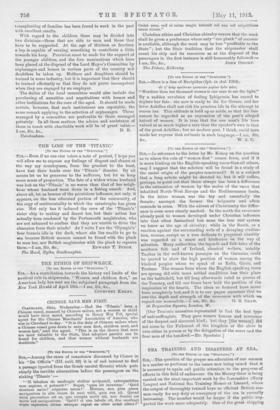SEA TRAINING AND DISASTERS AT SEA. [To THE EDITOR OF
THE " SPECTATOR." 1 SIR,—The question of the proper sea-education of our seamen is a matter so pertinent to the issues now being raised that it is necessary to again call public attention to the progress of efforts in this field of endeavour. On the Mersey there is being carried on the most important work by the Lancashire (Navy League) and National Sea Training Homes at Liseard, where the output of thoroughly trained boys as efficient British sea- men ready for any duty or emergency of the sea is annually increasing. The number would be larger if the public sup. ported the work more adequately. One of the great shipping
lines is practically manned by sailors who owe their nautical schooling solely to this national and Mersey institution. There are certain points which make the system and methods of this scheme unique and which briefly are as follows :-
(1) A National Work.—Any British boy of good character, health, and physique can be admitted. (2) An Economy.—It is an economy to make a national asset of a poor boy who very probably would otherwise become a burden on the ratepayers. (3) A True Charity.—A poor boy of good character, i.e., one who has resisted the temptations of poverty, has in him the stuff to make a man. He deserves help, . . . (The criminal and vicious have many rescue homes ; how many help the good?) (4) Truly Tolerant.—Boys of any creed or sect are admitted. (5) An Efficient Work.—Government and private inspection admits the complete success of the system and methods. More applications are received from shipowners for boys than can be supplied. This is the best possible testimony. (6) It is not a Waste cf Money.—No money is spent on adver- tisement or charity commissions. All gifts go to the expenses of maintaining the institution. (7) No Work Wasted.—On his return from sea each boy is met, and not allowed to drift to the streets. His sea-kit is put in order, he is protected from outside evil influences, and his money banked for him. He is offered a house at the Home until a ship is again found for him, and he is signed on for another voyage. (8) A Danger averted.—It is an Imperial peril that there are 40,000 aliens manning the British mercantile marine. These should be replaced by efficient British seamen. Our sea commerce is the source of our supremacy.
It is as true to-day as in the history of the past that at sea it is always the human element on which safety, prosperity, and success depends. The superseding of man by machinery can be carried to a certain point but no further, and it is obvious that the captain of a ship which has for a crew men who are sailors by choice, training in youth, and practice is in a happy case when he has to call on them in time of danger, or even for mere professional loyalty when in port. When we are considering ways and means to ensure the security of life and property at sea let us first remember that human ingenuity in providing safeguards of construction will always fail if the crew of a vessel are not first and last sailors—British sailors.
—I am, Sir, &c., ALAN FIELD. Tower Building, Water Street, Liverpool.











































 Previous page
Previous page